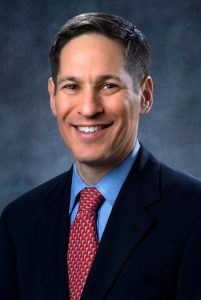There has been more than 100 measles cases confirmed and reported in the United States in 2015 to date, which has drawn concern from health officials at all levels.

In a interview with Norah O’Donnell on CBS’s Face the Nation, Centers for Disease Control and Prevention director, Dr Tom Frieden discussed the current measles outbreak situation. Below is the transcript:
O’DONNELL: Another big story that’s causing concern across the country is the measles outbreak. According to the Centers for Disease Control as of today there are at least 102 reported cases of measles in 14 states.
Dr. Tom Frieden is the head of the CDC; he joins us from Atlanta.
Doctor, good to see you.
Are the numbers of measles cases going up?
DR. THOMAS FRIEDEN, DIRECTOR, CDC: We are likely to see more cases, that are preventable. They’re preventable by vaccine and for places that haven’t vaccinated there’s aggressive public health action to identify contacts, to isolate sick people, to quarantine people who have been exposed. But the best way to prevent measles is with vaccination.
O’DONNELL: We learned just this week that a New York college student boarded an Amtrak train in Penn Station on his way back to school, possibly exposing hundreds of people to measles.
What do we know about that case?
FRIEDEN: In terms of when and where that individual was sick our greatest concern is for the college itself, which may have many kids who haven’t been vaccinated.
What we’ve seen is that as over last few years, a small but growing number of people have not been vaccinated, that number is building up among young adults and adults in society. And that makes us vulnerable. We have to make sure that measles doesn’t get a foothold in the U.S. It’s been actually eliminated from this country for 15 years; all of our cases result ultimately from individuals who have traveled and brought it back here. We have to stop it from getting a foothold here.
O’DONNELL: Well, that’s right. The CDC had declared in the year 2000 that measles had been eliminated.
But you look at the graph you have more and more cases being reported, especially in the last several years, most of those cases are in individuals who have not been vaccinated.
What we see is growing trend of parents who are getting what’s called personal belief exemption.
Do we need to reconsider those types of exemptions?
FRIEDEN: Well, the places around the country that really require that that personal belief be something that’s deeply held and longstanding have much higher vaccination rate.
But overall we have a 92 percent vaccination rate in this country and even among those parents whose kids have not been vaccinated, most of them don’t have that deeply held concern. They just may not recognize that measles is still with us, that it’s serious and that not getting your kid vaccinated is not only a risk for you own kid but puts other vulnerable kids in your community at risk.
O’DONNELL: But, Doctor, I was fascinated to see some of the numbers. This is according to the CDC, your own organization.
California, which is now the epicenter of this growing measles outbreak because it started in Disneyland, there last year almost 8 percent of kindergartners, 41,000 children failed to get required immunizations against MMR– measles, mumps and rubella. Look at the state of Oregon, that number is 6.8 percent; in Pennsylvania it’s nearly 15 percent of kindergartners, 22,700 kindergartners do not have these vaccinations.
What is going on?
FRIEDEN: We are very concerned by the growing number of people who are susceptible to measles and to the possibility that we could have a large outbreak in this country as a result.
Parents are concerned; they want their kids to be safe and healthy. The science is clear. Study after study has shown that there are no serious long-term adverse consequences for measles.
Of course, it can hurt your arm; one in six kids can have a fever 10 days after, but the vaccine is safe and effective and for those parents who may think that measles is gone, it’s still here. And it can be quite serious.
O’DONNELL: But you look at states like Mississippi and West Virginia. Those two states have mandatory vaccination rules, they do not allow these exemptions and they have almost 100 percent vaccination rates.
Do we need to think about on other states making vaccinations absolutely mandatory?
FRIEDEN: We’ve worked community by community, and it’s a decision for the school board, for the community; last year we had a large outbreak in an Amish community.
We worked closely with the community, we got vaccination done, we increased use of isolation and quarantine and the outbreak stopped. We can control it.
The future is within our control. We vaccinate well, we increase those vaccination rates, we can stop measles just as we stopped it before.
O’DONNELL: Dr. Tom Frieden, good to see you. Thank you for joining us.
FRIEDEN: Great to see you. Thank you.


Measles is activating on a mass scale NOW due to the vaccines & iron poisoning. ALL symptoms, disease & deaths are due to Measles & iron — NOT JUST rash & flu-like symptoms as the officials claim.
Measles requires a host with iron to replicate; iron intake is at an unprecedented level.
http://www.unveilingthem.com/IronFacilitatesPathogenGrowth.htm
Deaths & hospitalizations are set to soar NOW in 2015. This is the extermination plan.
For further information:
http://www.unveilingthem.com/
cab